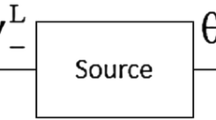Abstract
The chapter will consider the problem of the computability of consciousness and provide evidence from different fields that supports the position that it is non-computable. If consciousness were computable then the present, which includes sentient agents, is completely determined by the past, and so one can emulate it and, therefore, conscious or sentient machines will be built. The arguments in favor of the non-computability of consciousness are: first-person accounts of creativity, the fact that mathematical logic is associated with incompleteness, and that consciousness appears to have the capacity to halt any computation in the brain. The non-computability position is consistent with the Orthodox Copenhagen Interpretation of quantum theory, in which the subject and the object are forever separated by the Heisenberg Cut, which, in turn, implies that materiality and consciousness are like two sides of a coin. The question of how the two can interact, as in controlling the quantum state through observation, will be discussed. Larger philosophical questions related to the problem of consciousness will be considered and assumptions behind the building blocks of reality as in space, time, and matter will be examined together with recent results from logic that are relevant to this discussion.
Access this chapter
Tax calculation will be finalised at checkout
Purchases are for personal use only
Similar content being viewed by others
References
Baars, Bernard J., and Stan Franklin. 2009. Consciousness is computational. International Journal of Machine Consciousness 1: 23–32.
Berndt, Bruce C., and Robert A. Rankin. 1995. Ramanujan: Letters and commentary. Providence: American Mathematical Society.
Bohr, Niels. 1958. Atomic physics and human knowledge. New York: Wiley Interscience.
Eccles, John C. 1990. A unitary hypothesis of mind-brain interaction in the cerebral cortex. Proceedings of the Royal Society of London B240: 433–451.
Freeman, Walter J. 1999. How brains make up their minds. New York: Columbia University Press.
Gibson, James Jerome. 1979. The ecological approach to visual perception. Boston: Houghton Mifflin.
James, William. [1890] 1950. The principles of psychology. New York: Dover Publications.
Kafatos, Menas, and Robert Nadeau. 2000. The conscious universe: Parts and wholes in physical reality. New York: Springer.
Kak, Subhash. 2009. The universe, quantum physics, and consciousness. Journal of Cosmology 3: 500–510.
———. 2016. The nature of physical reality. Mississauga: Mt. Meru Publishing.
———. 2019a. Is consciousness computable? NeuroQuantology 17: 71–75.
———. 2019b. Are there limits to artificial intelligence? Current Science 116: 1951–1952.
———. 2020. Information theory and dimensionality of space. Scientific Reports 10: 20733.
———. 2021. Asymptotic freedom in noninteger spaces. Scientific Reports 11: 3406.
———. 2022a. The limits to machine consciousness. Journal of Artificial Intelligence and Consciousness 9: 59–72.
———. 2022b. Number of autonomous cognitive agents in a neural network. Journal of Artificial Intelligence and Consciousness 9: 227–240. https://doi.org/10.1142/S2705078522500023
———. 2022c. The vedic tradition: Cosmos, connections, and consciousness. Bengaluru: SVYASA University.
Kak, Arushi, Abhinav Gautam, and Subhash Kak. 2016. A three-layered model for consciousness states. NeuroQuantology 14: 166–174.
Kanigel, Robert. 1991. The man who knew infinity. New York: Scribner’s.
Koch, Christof. 2004. The quest for consciousness. Englewood: Roberts & Company Publishers.
Libet, Benjamin. 1985. Unconscious cerebral initiative and the role of conscious will in voluntary action. The Behavioral and Brain Sciences. 8 (4): 529–566.
Misra, B., and E.C.G. Sudarshan. 1977. The Zeno’s paradox in quantum theory. Journal of Mathematical Physics 18: 756–763.
Moore, Walter J. 1994. Schrödinger: Life and thought. Cambridge: Cambridge University Press.
Nayar, Pramod K. 2018. Posthumanism. Hoboken: Wiley.
Nielsen, Michael A., and Isaac L. Chuang. 2000. Quantum computation and quantum information. Cambridge: Cambridge University Press.
Penrose, Roger. 1989. The Emperor’s new mind. London: Penguin Books.
———. 1994. Shadows of the mind. Oxford: Oxford University Press.
Pribram, Karl H. 2004. Consciousness reassessed. Mind and Matter 2: 7–35.
Rushby, John, and Daniel Sanchez. 2018. Technology and consciousness. Technology and consciousness workshops report. Menlo Park: SRI International. http://www.csl.sri.com/~rushby/papers/techconscwks2017.pdf. Accessed 8 Aug 2022.
Schrödinger, Erwin. 1967. What is life? Mind and matter. Cambridge: Cambridge University Press.
Stapp, Henry P. 2007. Mindful universe. New York: Springer.
Wang, Hao. 1997. A logical journey: From Gödel to philosophy. Boston: MIT Press.
Zeki, Semir. 2003. The disunity of consciousness. Trends Cognitive Science 7: 214–218.
Author information
Authors and Affiliations
Editor information
Editors and Affiliations
Rights and permissions
Copyright information
© 2024 The Author(s), under exclusive license to Springer Nature Switzerland AG
About this chapter
Cite this chapter
Kak, S. (2024). On the Non-Computability of Consciousness. In: Satsangi, P.S., Horatschek, A.M., Srivastav, A. (eds) Consciousness Studies in Sciences and Humanities: Eastern and Western Perspectives. Studies in Neuroscience, Consciousness and Spirituality, vol 8. Springer, Cham. https://doi.org/10.1007/978-3-031-13920-8_7
Download citation
DOI: https://doi.org/10.1007/978-3-031-13920-8_7
Published:
Publisher Name: Springer, Cham
Print ISBN: 978-3-031-13919-2
Online ISBN: 978-3-031-13920-8
eBook Packages: Religion and PhilosophyPhilosophy and Religion (R0)




